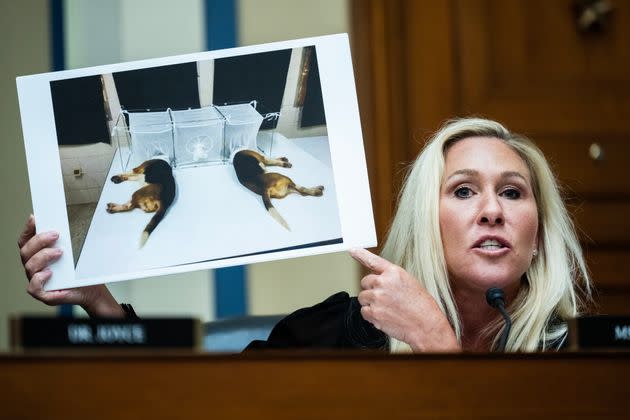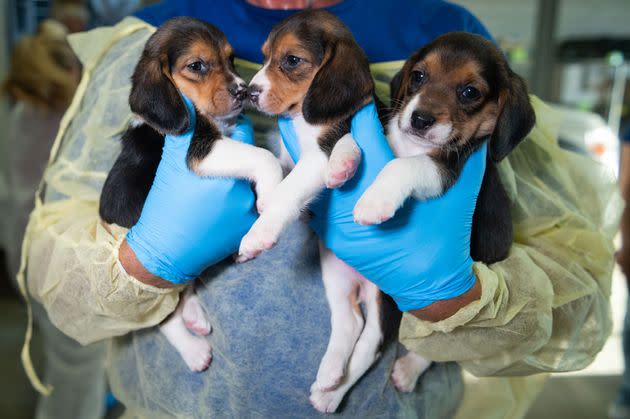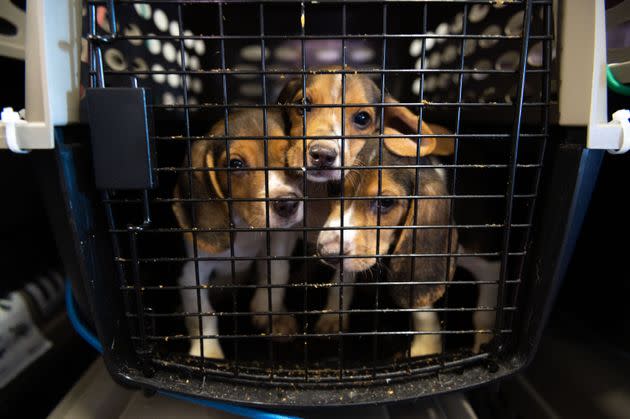Marjorie Taylor Greene Gave A Bizarre Animal Testing Rant Against Fauci. Here’s The Truth.
Rep. Marjorie Taylor Greene (R-Ga.) tore into Dr. Anthony Fauci in an off-topic rant before Congress on Monday while accusing him of personally approving “disgusting and evil” animal testing on dogs that she said Americans have not agreed to pay for.
“I want you to know Americans don’t pay their taxes for animals to be tortured like this,” the far-right congresswoman told the former head of the National Institute of Allergy and Infectious Diseases while holding up a photo of two beagle test subjects during an unrelated hearing on the COVID-19 pandemic.
“As a dog lover, I want to tell you that this is disgusting and evil, what you signed off on,” she said while appearing to blame a visibly confused Fauci because of his past role as director of the NIAID, part of the National Institutes of Health. “The type of science you are representing, Mr. Fauci, is abhorrent and it needs to stop.”
Marge Greene turns the Fauci hearing into a circus pic.twitter.com/zFIRUPnU9K
— Aaron Rupar (@atrupar) June 3, 2024
The photo originates from a sand flea experiment involving beagles in the North African country of Tunisia that incorrectly listed the NIAID as a financial sponsor when it was first published in 2021.
The NIAID denied financing the experiment, and the study’s publisher issued a correction amid a firestorm of public attacks on the health agency and Fauci which, as demonstrated through Greene’s remarks on Monday, continues today.
Regardless of that photo’s sourcing, similar laboratory testing on beagles and other animals is continuously carried out in the U.S. and abroad using federal funding. These studies include past experiments that were similar to the sand flea study in Tunisia. Animal rights advocates agree that more changes need to be made, including how U.S. taxpayer money is used to support it.

“There’s still about 40,000 beagles that are used in research and testing in the U.S. every year, so unfortunately it is still commonplace for dogs to be used in research and testing,” Victoria Katrinak, director of animal research issues for the Humane Society of the United States, told HuffPost. The animal welfare group has continued to push for nonanimal alternatives in research and testing because of the extreme and fatal conditions that animals endure.
“Unfortunately, when you’re subjecting animals to typical experimental procedures, it’s going to be cruel, it’s not going to be humane,” she said. “You’re dosing animals with potentially high doses of chemicals to see what their reaction is, to try to create a toxic effect, and so that can include a lot of suffering. And there’s no humane way to do it.”
Some past experiments in the U.S. ― including the force-feeding of laundry detergents, pesticides, and industrial chemicals ― were documented in a disturbing 2018 report by the Intercept.

A range of animals are used in these studies, but beagles are often chosen as test subjects because they have a docile nature that will permit researchers to perform procedures on them “without them fighting back,” Katrinak said.
While the federal government does have a large role in funding and carrying out animal studies, it’s not particular to one agency or one individual in government, Katrinak said in response to Greene specifically targeting Fauci and the NIH, which is the nation’s primary federal agency for conducting and supporting medical research.
The NIH spends an estimated $14.5 billion of taxpayer dollars on research that involves animal experimentation annually, according to the Animal Legal Defense Fund. But “wasteful and cruel” methods of animal research are a “systemic, industry-wide problem,” said the executive director of the animal law advocacy organization, Chris Green.
You're dosing animals with potentially high doses of chemicals to see what their reaction is, to try to create a toxic effect, and so that can include a lot of suffering.Victoria Katrinak, director of animal research issues for the Humane Society of the United States
“Animal experimentation is not political or partisan and all taxpayers should know that they are footing the bill for scientific research they may find immoral and often fails to achieve its intended results,” he told HuffPost in a statement when also asked about Greene’s targeted attack. “ALDF believes the American public has a right to know how its money is being spent on animal research and should have a say in not wanting to be complicit in such harm. That’s how democracy works.”
An NIH spokesperson did not immediately respond to a request for comment on Greene’s remarks and on the agency’s annual spending on animal experimentation.
Like the Humane Society, the ALDF has advocated for expanding the use of nonanimal testing alternatives while pointing to findings by the U.S. Food and Drug Administration that just 8% of the drugs tested on animals have been deemed safe and effective for human use. The remaining 92% are not.
“I served on a National Academies of Sciences committee in 2020 examining the Department of Veterans Affairs’ use of dogs in research, and we similarly found that many of those experiments were unnecessary and harmful,” Green said.

The Animal Welfare Act of 1966 is the nation’s primary federal law that regulates the treatment of animals in research, teaching, testing, exhibition, transport and by dealers. On Monday, its use resulted in a record $35 million fine against a Virginia company that bred beagles for medical research after the dogs were found living without adequate veterinary care, adequate staffing and safe living conditions. More than 4,000 beagles were removed from the facility.
Animal activists argue that the law doesn’t do enough, however. Of the more than 1 million animals used in laboratory experiments in the U.S. annually, roughly 95% are not protected under the law, according to the ALDF.
“Unfortunately that law has severe limitations because it only applies to certain species, certain warm-blooded species. It does not apply to mice or rats, which are the most commonly used species in research and testing,” Katrinak said.
It’s not clear whether Rep. Greene plans to support or spearhead legislation that would challenge the use of federal funding in animal experimentation or how it’s performed. A representative for her office did not respond to HuffPost’s request for comment Monday.
Katrinak said there are bipartisan efforts underway by other lawmakers, however. These include the Humane Cosmetics Act, which would prohibit animal testing in cosmetics, and the Better CARE For Animals Act, which would allow the Department of Justice to take action in extreme acts of animal cruelty, including instances not limited to research facilities.
The Humane Society has also petitioned the FDA to update its regulations to make it more clear to drug companies that they are able to use nonanimal alternatives in their testing, she said.
“The way the regulations are written now, it seems to require animal testing for everything,” Katrinak said. “There are better alternatives out there, and what we really want to see is that there is increased funding for these nonanimal alternatives.”
Related...
Jane Goodall Reflects On How A Childhood Dog Changed The Way She Saw Animals
South Dakota Animal Shelter Shades Kristi Noem: 'We Have Yet To Meet' An 'Untrainable' Dog
Animal Shelter Pleads For Help Fostering Dogs After Truck Crashes Into Building
Beagles Rescued From Breeding Center Become Guests Of Honor At Joyful Party
145 Beagles In 'Acute Distress' Seized From Massive Breeding Facility: Lawsuit
Thousands Of Beagles Need New Homes After Virginia Breeding Site Closes

